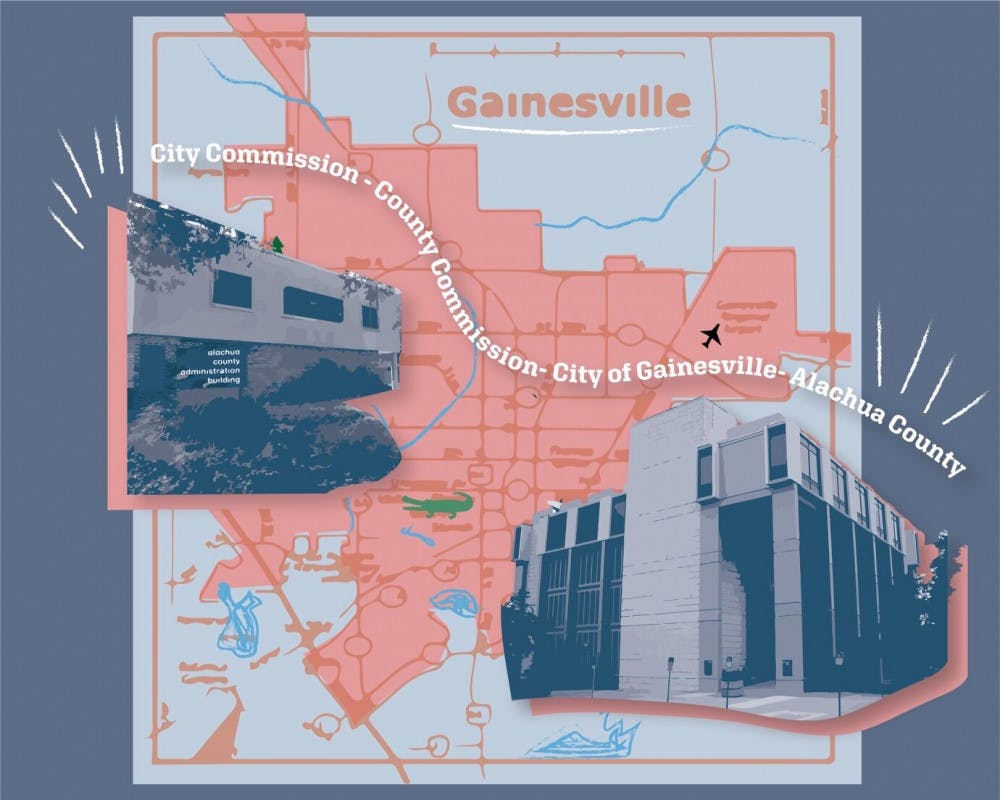Two opposing meetings, one by the city commission and the other by the Gainesville Regional Utilities authority, discussed the future of GRU May 23.
Founded in 1912, GRU was established as Gainesville’s first public utility and for over 100 years was overseen by the city commission. However, the passage of House Bill 1645 in 2023 reallocated control of the authority to a governor-appointed board of directors.
Since the bill was signed into law, there has been an ongoing community debate over who should have control over the utility. Searching for a solution, the city commission created ordinance 2024-352, which places a GRU oversight charter amendment on the November general election ballot.
The charter amendment will read in part, “Shall the city of Gainesville charter be amended to delete article VII, eliminating the Governor-appointed Gainesville Regional Utilities Authority and its appointed administrator that manage, operate, and control the city of Gainesville’s local public utilities, and placing that responsibility with the elected city commission and charter officer.”
Wes Wheeler, a retired lawyer, said the city commission certainly has the authority to place a referendum before the citizens of Gainesville. He attested to its legality during the meeting.
“We the people certainly have the right to amend our city charter through such a referendum,” he said. “This is the essence of home rule and of local democracy.”
Former GRU General Manager Ed Bielarski was appointed chair of the board by Gov. Ron DeSantis Thursday during the first GRU meeting of the session. He presented a slideshow titled “How the City Lost Control” to the history of GRU leadership over the last two decades during the meeting.
The city commission’s leadership led to debt and poor decisions, he said.
He emphasized the 2009 Biomass deal, which was made with the intention of advancing the City Commission’s net zero resolution by 2045. However, the deal was named one of the worst biomass deals in the country, according to a 2018 Partnership for Policy Integrity report.
It plunged the authority into debt, which he said caused GRU customers to pay 24% more than the municipal average at the highest rate of difference.
“In 2018, we bought it out and we saved $250 million dollars in debt reduction, but you can see the astronomical rise in debt at the utility,” Bielarski said. “As a result, the bills necessarily increased.”
The GRU authority aims to enact the wants of their average customers, which he said included the deprioritization of climate-conscious policies and green energy that could increase bills.
“You got to focus on the priorities of the average customer: low cost, reliable power. That’s what they want,” he said. “You can do surveys and they’ll say they want renewable power, and then you ask will they pay for it? They go, ‘no, we don’t want to pay for that.’”
RJ Della Salle, a 20-year-old UF Political Science junior and county commission intern, felt differently. He said green energy solutions are wanted and that he would be willing to pay increased utility bills for climate-friendly policies.
“The legislators who voted for this bill [HB 1645] in the state legislature are effectively the tools of Florida Power and Light handing over control of our local utility board to a governor,” he said.
Della Salle, a former South Florida resident, said his experience with FPL included ineffective responses to hurricanes and power outages. They only cared about helping wealthier residents, he said.
Utilities were an afterthought while he lived on campus, but now he said he considers them a top priority.
The Gainesville City Commission approved the second reading of Ordinance 2024-352 Thursday, giving constituents the opportunity to vote on where GRU control will be allocated in the November general election.
Della Salle said the initiative would have his support.
Mayor Harvey Ward said the people of Gainesville should be able to choose the board of directors for their utility.
Local accountability is more effective than a board appointed by a governor who the average person can’t have an audience with, he said.
“I think the basic question is, first, should the people be given the opportunity to decide, and then do the people want a board appointed by the governor? Or do they want to appoint their own board in every election?” Mayor Ward said.
While HB 1645 was presented to the state legislature as a local bill, League of Women Voters President Janice Garry said it wasn’t representative of average GRU customers.
“It had no input from our city commissioners,” she said. “They had not had input from the public in Gainesville, and we had no opportunity to provide input on it.”
GRU customers have openly spoken out against the appointed authority and HB 1645, which she said was a “disregard for democratic processes.”
“When the authority board took over GRU we became the only public utility in the nation that is governed by a governor rather than by some form of local governance,” Garry said.
However, Gabby Martinez, a GRU customer of 19 years, advocated for the continuation of the governor-appointed authority during public comment in the first meeting of the session. She said the former city commission was the cause of “sky high” bills after the 2009 Biomass deal.
“GRU customers tried to reason with the city commissioners for over 15 years to no avail,” Martinez said. “We tried everything. We had no choice but to go to Tallahassee for help.”
A similar GRU oversight charter amendment appeared on the general election ballot in 2018, and approximately 60% of citizens disapproved of altering the city commission’s authority over GRU.
Leticia Cid, the Elon Property Manager for Archer Court Apartments, said the issue should be focused on effectively serving citizens rather than politics.
“You have people coming out to read the meters, and they’re not doing the proper readings, and so you’re getting wrong bills,” she said.
GRU was “very difficult” to get in touch with about her concerns.
“I hadn’t had any good experience as far as that’s concerned,” Cid said.
Contact Morgan Vanderlaan at mvanderlaan@alligator.org. Follow her on X @morgvande
Morgan Vanderlaan is a second year political science major and a Spring 2025 metro general assignment reporter. She has previously worked on the enterprise desk as a political reporter and on the county and city commission beat. When she's not on the clock she can be found writing, reciting and watching theatre!






